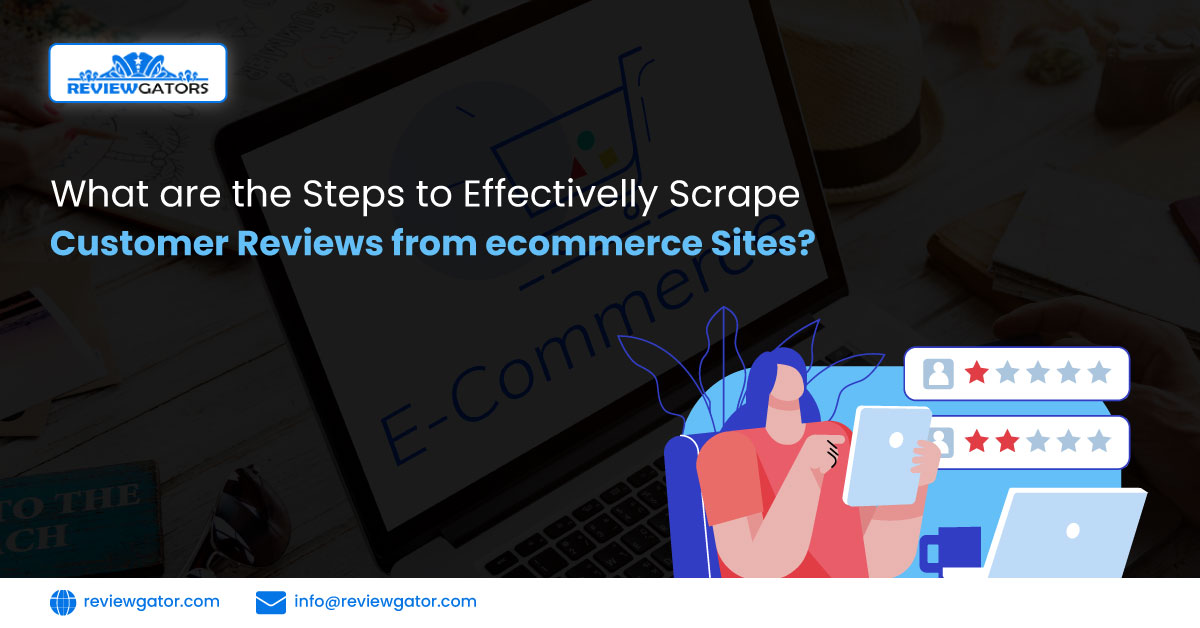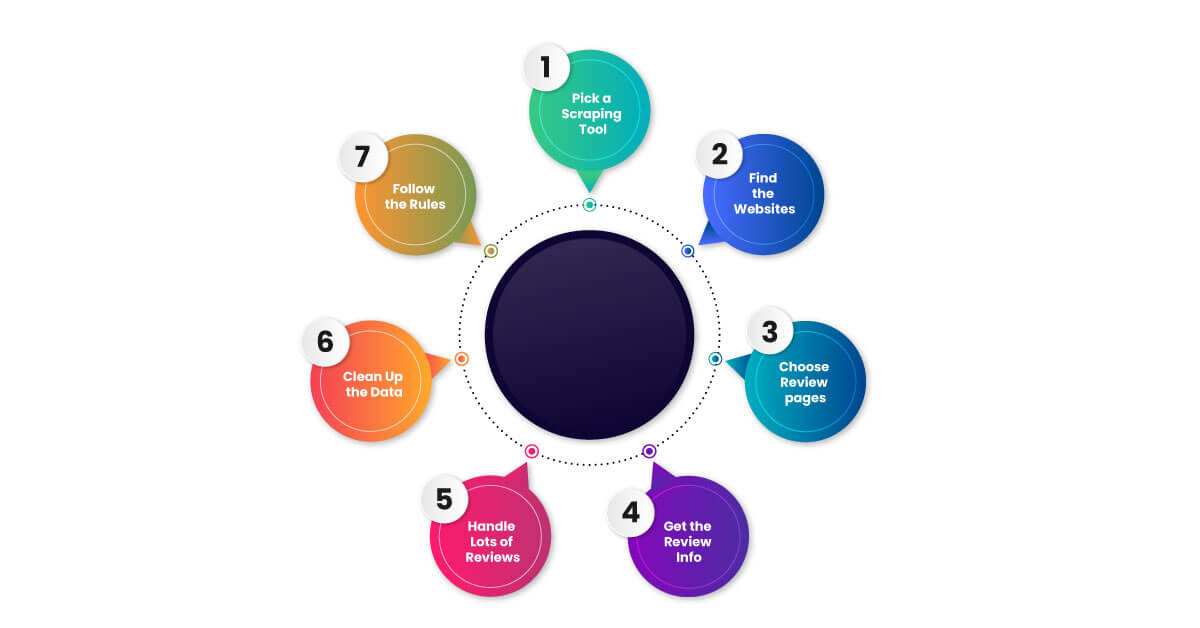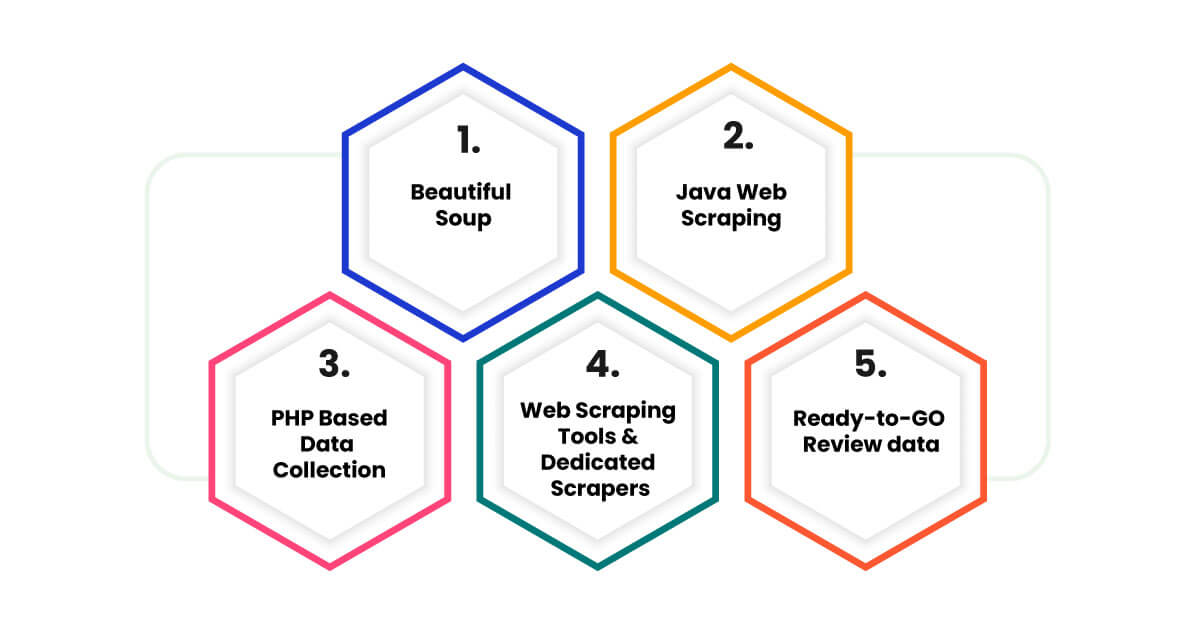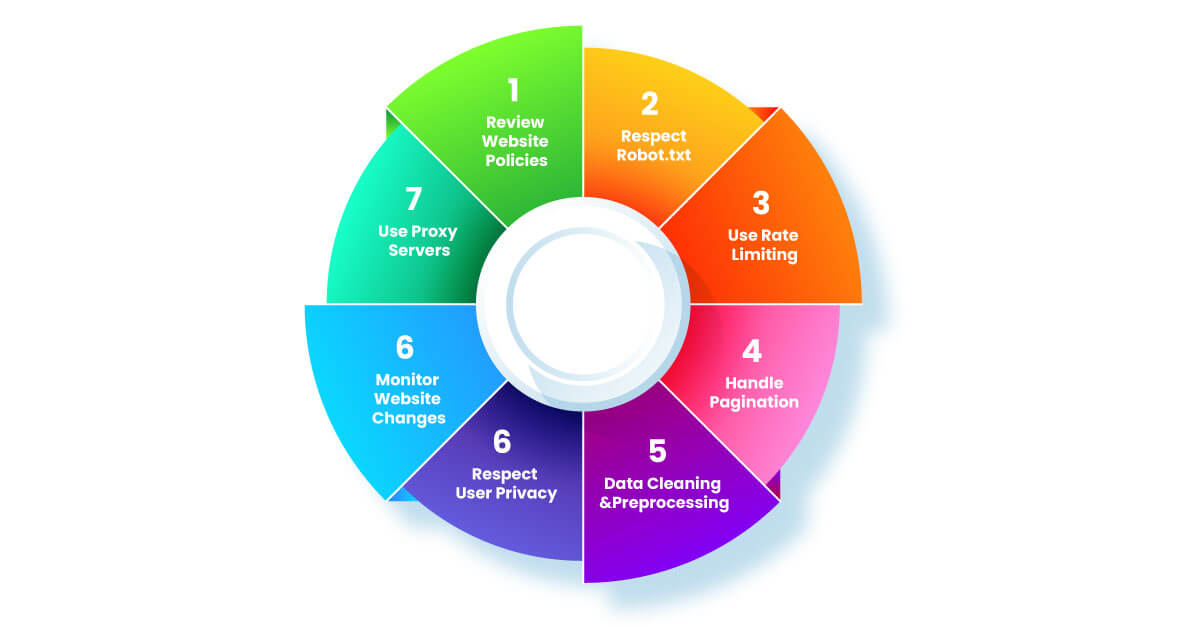Blog / Discover how to collect data insights with our tips on scraping customer reviews from eCommerce sites. Learn the process of e-commerce review scraping now!
29 Mar 2024

Businesses of all sizes want new ways to grow. One popular strategy is scraping customer reviews. This process of eCommerce review scraping lets businesses learn valuable insights about what customers think of their products or services. Scraped data can also improve marketing and create better business plans. While scraping reviews may seem difficult at first, it can be a helpful tool for boosting a business's profits.
Many factors influence customers' purchasing decisions. When people decide to buy something, they often look at ratings and read what other customers have said. In fact, almost all customers, about 95%, read product reviews before buying. However, businesses struggle to collect many customer reviews from various websites. Web scraping allows businesses to monitor and gather customer reviews from social media and websites.
Product review scraping refers to the process of extracting and collecting reviews and associated data from e-commerce websites and other online platforms. This data typically includes such as customer ratings, written reviews, product details, reviewer demographics, and timestamps. It involves using special software to automatically collect reviews and feedback from websites like online stores, social media, forums, and review sites.
The reviews are then analyzed to get insights into customer thoughts and feelings towards specific products or brands. This customer feedback data allows companies to gauge product popularity, identify improvement areas, and make more informed choices when creating new products, planning marketing campaigns, and enhancing customer service offerings. Companies find value in understanding customer opinions gathered from online reviews by using review scraper APIs. Businesses scrape product reviews to enhance their products and services based on user feedback and sentiments.

Businesses can scrape product reviews from eCommerce websites by following a specific procedure that helps ensure a smooth scraping process by using review scraper APIs.
Web scraping tools are like specialized software and review scraper APIs that help you extract data from websites. It includes popular tools, including BeautifulSoup, Scrapy, and Selenium. When choosing a tool, consider factors like ease of use, scalability (how well it handles large amounts of data), and customization options. Some tools are more accessible for beginners, while others offer more advanced features for complex scraping tasks.
Decide which e-commerce websites you want to scrape reviews from. Review the website's terms of service and robots.txt file to ensure that scraping is allowed. Ensure you're not violating any rules or policies by scraping the website's data without permission.
Once you've identified the e-commerce sites, navigate to the specific pages where product reviews are located. These pages could be product detail pages or dedicated review sections where customers leave their feedback. Grab the URLs of these pages so your scraping tool knows where to look for reviews.
Use your chosen scraping tool and review scraper APIs to extract relevant information from the review pages. This information typically includes the text of the reviews, star ratings given by customers, details about the reviewers (such as usernames or demographics), and timestamps indicating when the reviews were posted. Pay close attention to the structure of the website's HTML code to locate and extract the desired elements accurately.
Many e-commerce sites paginate their review sections, which means that reviews are spread across multiple pages. Implement logic in your scraping script to navigate through these pages and collect reviews from each page. It is crucial to make sure that your scraping tool can handle pagination and retrieve all reviews, even if they're spread across multiple pages.
Once you've scraped the reviews, the data may contain noise or inconsistencies that need to be cleaned up. This involves removing unnecessary HTML tags, standardizing formats (such as converting dates to a uniform format), and handling missing values. Cleaning up the data makes it easier to analyze and extract meaningful insights.
Adhere to the website's policies and guidelines while scraping data. Avoid aggressive scraping techniques that may overload servers or violate terms of service. Scrape at a reasonable rate to respect the website's bandwidth and server resources. Always be respectful and ethical in your scraping practices to maintain a positive relationship with the website and avoid any legal issues.

There are different methods to scrape data from eCommerce websites. Here are five ways to gather customer reviews and ratings using eCommerce review scraping and review scraper APIs:
This method involves using a tool called Beautiful Soup to scrape reviews. It works by downloading the website's content and looking through the HTML code to find specific tags containing the review text. Finally, it copies the desired text from these tags to create the output.
With Java-based scraping, you access the website's Developer Console to get the HTML code. Then, you extract the information you need, parse the code, and export the relevant parts into a CSV file using a method called XPath.
PHP can also be used to collect website code. This involves using functions like 'parse code' and 'echo' to access the code and remove unnecessary parts. The 'GLOBALS' function can then be used to isolate and extract the desired information enclosed in tags.
Another option is to use automated web scrapers designed specifically for gathering review data. These tools are pre-built to work with different types of websites like Amazon or eBay. They automatically extract and process seller ratings, reviews, and other vital data.
Alternatively, you can use pre-collected review datasets, such as those available from Amazon. These datasets provide review data without the need for coding or scraping. They offer a quick and easy way to access review information without the hassle of setting up software or writing code.

It is important to utilize the best practices by leveraging review scraper APIs in this digital world. Let’s understand the best practices of Ecommerce review scraping:
Before scraping reviews from an e-commerce website, carefully review its terms of service and robots.txt file to ensure that scraping is allowed. Some websites explicitly prohibit scraping or have restrictions on data usage.
Follow the guidelines outlined in the website's robots.txt file. This file defines which parts of the website are off-limits to web crawlers and scraping bots. Respect these directives to avoid legal issues and maintain ethical scraping practices.
Implement rate limiting to control the frequency of your scraping requests. Sending too many requests in a short time can trigger rate-limiting tools on the website's server or lead to IP bans. Businesses can boost scraping activities to avoid detection and minimize the risk of being blocked.
Many e-commerce websites paginate their review sections, meaning that reviews are spread across multiple pages. Develop scraping scripts capable of handling pagination to ensure that all reviews are captured, even if they're distributed across multiple pages.
After scraping reviews by uing review scraper APIs, clean and preprocess the data to remove noise and inconsistencies. This may involve tasks such as removing HTML tags, standardizing date formats, and handling missing values. Clean data is easier to analyze and generates more accurate insights.
Be mindful of user privacy when scraping reviews that contain personal data. Avoid collecting sensitive data without explicit consent and ensure that your scraping activities comply with applicable data protection regulations, such as GDPR.
E-commerce websites may update their structure or introduce new anti-scraping measures over time. Stay vigilant and monitor for any changes that may affect your scraping scripts. Regularly review and update your scraping methods to adapt to evolving website configurations.
Consider using proxy servers to anonymize your scraping requests and prevent your IP address from being blocked. Rotating IP addresses through proxy servers can help distribute scraping load and reduce the risk of detection.
Here are some use cases for scraping product and customer reviews from e-commerce sites:
Many businesses research customer comments on e-commerce websites since such feedback gives plenty of start-ups what people adore and dislike with eCommerce rating scraping services by Reviewgators. It helps them understand what consumers are, what they want, and how they do it. A simple indication of that is the companies are equipped with the means to identify new trends, figure out what their customers want, and stay on top of their competitors' acts.
Customers can also share their feedback on various competing sites. That is another example illustrating how businesses can use competition to their benefit. This assists them in unfolding what their competitors are doing well or the side they are privileged to. Compared to the products of competitors, companies understand how they perform, and they can figure out ways of improving on the same.
Customer reviews offer feedback on product aspects that people love or hate, which can sometimes be very useful. A business that reads and analyzes these reviews can figure out areas of its product that need to be changed to improve its quality. This assists them in determining the purpose for which to channel their efforts and which variables are to be improved first.
Seeing the reviews from netizens present on e-commerce sites modifies all that businesses sell online. Suppose they are responding to negative reviews and appreciating the customers with the positive ones in return. In that case, companies will update the customers that they are an engagement-driven firm and entertain customer feedback. This very comes in handy as such a firm later maintains a good reputation with its customers and, as a result, remains trusted.
Words of customers, being positive in their reviews, are kind of mini-advertisements that push other people towards purchasing this product. Product reviews can be used in advertisements and social media posts to indicate to prospective customers that the products are worth trying. This adds more credibility to the product and persuades more people to purchase the item.
Businesses of all sizes are always searching for new and smart ways to grow. One method gaining popularity is eCommerce review scraping services. This means collecting feedback from customers who've used their products or services. These reviews give businesses really helpful insights into what customers think. They can use this data to improve their marketing and make better business plans. Even though scraping customer reviews might seem tricky at first, it's actually a useful tool for businesses wanting to make more money.
When people decide to buy something, they often look at ratings and read what other customers have said. In fact, almost all customers, about 95%, read product reviews before buying. But for businesses, gathering lots of reviews from different websites can be hard. That's where web scraping experts ReviewGators come in. It helps businesses keep track of and collect customer reviews from social media and other websites.
Feel free to reach us if you need any assistance.
We’re always ready to help as well as answer all your queries. We are looking forward to hearing from you!
Call Us On
Email Us
Address
10685-B Hazelhurst Dr. # 25582 Houston,TX 77043 USA